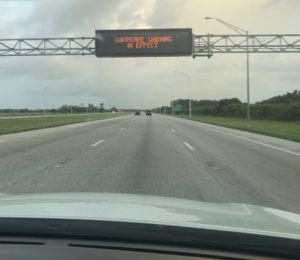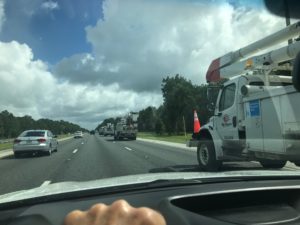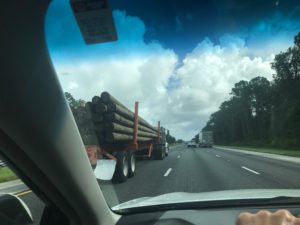I was in Mexico Beach last winter and stood in the midst of Hurricane Michael’s lingering devastation– broken glass, shredded trees, leveled houses, piles of debris, “don’t forget us” graffiti, and blue tarp band-aids. One week ago, I monitored the developments of Hurricane Dorian, having planned to be in Miami during its anticipated landfall. Once it was fairly certain that Miami would be spared, we drove down from North Carolina aiming to cross the projected stormpath in advance of its arrival and get there safely. Say what you will about the prudence or necessity of that decision, but what struck me was this:
“Does our present energy system make sense?”
A mix of gut feeling, observation, and critical theory were my travel companions on the drive down to Miami last Sunday. The heaviness of a catastrophic storm sitting there churning, looming almost in eye site yet withholding its intent, and a long stretch of highway down the Florida peninsula and we’re heading ever closer to Dorian. I have to say this was new for me and boy did it give me new perspective.
The potential of a gas shortage and panic was my first notion of energy system fragility. What if gas supplies run out on our way, after all the pumps were dry the day before? I stopped for gas each time I was down to ¾ of a tank, which gave me a misplaced peace of mind and also a gauge of changes in overall fuel supply along the route. Scarcity at the next stop might have convinced us to reassess. Conversely, availability coaxed us on ever closer to Dorian. I kept a mental accounting of the number of gas tanker trucks I saw on the highway (“OK, gas is being resupplied!”). I found myself cheering for this despite knowing that I myself was feeding the deadly carbon beast. Somewhat ironically, my research found that the giant fuel tanks at port terminals in Jacksonville, Tampa and Ft. Lauderdale had to remain partly full so they wouldn’t blow away in the storm. This was a systems problem (i.e. stock and flow with delays) and in spite of the fuel distribution system’s apparent sophistication, it seemed very fragile with little room for interruption. A system of giant tanker ships, refineries, pipelines, storage tanks the size of cities, fleets of tanker trucks, and gas stations on the corner of every interstate exit could be paralyzed by one panic let alone the actual storm damage. I read where Florida consumes 30 million gallons of gas every day! I found myself hoping there would be a few of those gallons for me. Yep, I was caught up in a fragile system that was loading the climate dice.
We drove amongst convoy after convoy of pole line utility trucks going in both directions. The many we passed in the Charlotte area and all along I-95 were met with just as many going the opposite direction and that just didn’t make efficiency sense to me. Convoys from Nebraska, Massachusetts, North Carolina, Michigan and Louisiana. I’m sure there were others. These convoy’s clogged gas stations– 10 to 20 big trucks at a time taking on diesel fuel hundreds of gallons at a time. The logic of disaster preparations ruled that they were deploying up and down the southeast coast. All the energies and “invasion-style mobilizations” that are celebrated during these storms suggest something. Yes, these pole line crews are highly skilled, the massive coordination of this rollout is marvelous, and I love seeing them when my power is down in an ice storm, but I’m feeling something else too.
Again, “does our present energy system make sense?”
Such mobilization of resources aimed at a symptom but missing the underlying cause (in fact, amplifying its cause since these “solutions” involve massive carbon footprint, and also reinforcing the hubris behind our dominant energy system). Whether it’s rebuilding a power grid after a storm or installing massive pumps to protect cities from flooding, it:
“is kind of like walking a plank: it works as long as you don’t get to the end of it.”
(This is an apt metaphor for our situation coined by Kristina Hill, associate professor at the University of California Berkeley. Sinking Cities: Miami. Clip begins at 45:10)
I thought about people in the Bahamas and even in south Florida that did not have the means to flee Dorian. How fair was it that I was driving potentially into harm’s way while others, without resources necessary to evacuate, had no choice but to deal with the new realities of climate emergency. Climate justice for those many front line communities including here in Miami and now, especially in the Bahamas, should be a major moral consideration when pondering our question. 
What makes more sense than our present energy system? Massive energy inputs just to maintain a fragile grid, transportation systems, and flooding streetscapes or to recognize our hubris and avarice has put us near the end of the plank and to reimagine what could be better– distributed generation via solar and other renewables with microgrids and people-centered smart grids. And of course accompanying this would be a more just and sustainable way of organizing our society. There will be another hurricane, and another…let’s remember that, even though current leadership seems to have forgotten. Rest assured, an unfortunate number of them will be Category 5 just like several in very recent history. Will we be smart and resilient, or will we keep digging the hole deeper, celebrating blindly on the way down?